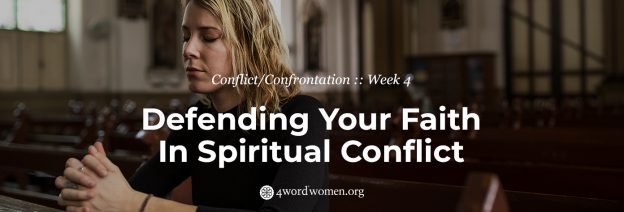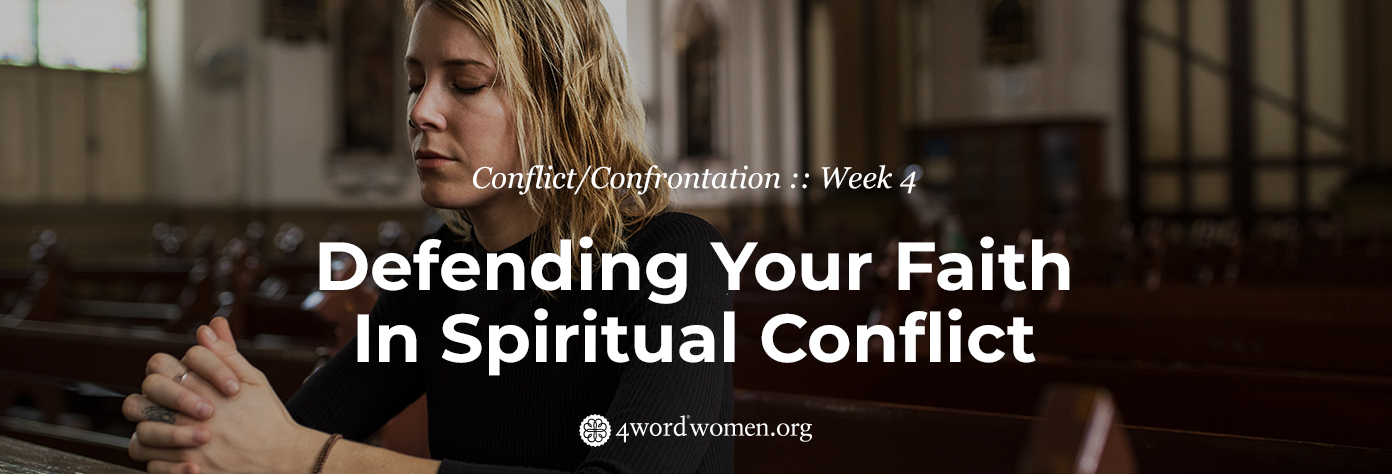
Defending Your Faith In Spiritual Conflict

Spiritual conflict and confrontation is something many – if not all – of us will encounter in our walk with God. To learn how to react in a Christ-honoring way, we asked 4word Advisory Board member Steve Haas to share tips and advice he’s gleaned from his years as a pastor and senior engagement leader with World Vision.
What does spiritual conflict entail, on a global and personal level?
Scripture is clear that in the same way earthly battles exist for position, power, property and prestige, aggressive spiritual battles rage as well. In a world largely defined by the five senses, it’s easy to presume that only that which we experience tangibly is worthy of our attention. But the Bible teaches there is a guerilla war being waged with human lives in the balance. Paul was trying to help the recipients of his letter to Jesus’ followers in Ephesus to differentiate between physical and spiritual battles in Ephesians 6:12:
”For our struggle is not against flesh and blood, but against the rulers, against the authorities, against the powers of this dark world and against the spiritual forces of evil in the heavenly realms.”
Literally, two Kingdoms are in conflict (Matthew 12:22-30): the Kingdom of Heaven and the kingdoms of this world. Although all authority resides in Jesus due to His death and resurrection at Calvary, Satan and his forces are still given limited freedom to exercise their destructive power in opposition to God’s will and Kingdom advance. As to our place in this cosmic battle, every day we are given choices that either gains ground for God’s Kingdom in our obedience to His direction or cedes position to the enemy of our souls. It was for this reason that Oxford Professor C.S. Lewis wrote that no decision we make was ever to be considered “minor.” Obedience to Jesus’ direction and trusting in His promises is a stand upon which His Kingdom is built; a bulwark against Satan’s pernicious schemes.
Christianity is getting an increasing bad rap in the news. How, as Christians, can and should we respond to this?
Unfortunately, much of the bad rap is deserved. This happens whenever our actions aren’t in union with what Scripture teaches, regardless of the truth we claim to proclaim. We are to be defined by our love, both to those within our Christian fellowship as well as the community of those who follow someone/something else. Scripture’s teaching and the life of Jesus are clear on what our manner of living and style of speech are to be, and although it may appear out of sync with snarky volleys and crass personal attacks on social media, we haven’t been given a plan B. To just name a few:
James 1:9 – “My dear brothers and sisters, take note of this: Everyone should be quick to listen, slow to speak and slow to become angry …”
Matthew 5:43-48 – “You have heard that it was said, ‘Love your neighbor[a] and hate your enemy.’ But I tell you, love your enemies and pray for those who persecute you, that you may be children of your Father in heaven. He causes his sun to rise on the evil and the good, and sends rain on the righteous and the unrighteous. If you love those who love you, what reward will you get? Are not even the tax collectors doing that? 47 And if you greet only your own people, what are you doing more than others? Do not even pagans do that? Be perfect, therefore, as your heavenly Father is perfect.”
Colossians 4:6 – ”Let your conversation be always full of grace, seasoned with salt, so that you may know how to answer everyone.”
Ephesians 4:29 – “Do not let any unwholesome talk come out of your mouths, but only what is helpful for building others up according to their needs, that it may benefit those who listen.”
I have found these issues serve as a kind of audit of my own spiritual state and often need the mind/hearts of others to make them clear. I have to be careful, lest I misuse my position of leadership to bludgeon another person with my community’s battering ram, a community response infused with reaction to my perceived slight.
This doesn’t mean pollyanna responses devoid of truth or passion, but instead timely replies (if we are to reply at all), with love for the other as our bottom line. When we resort to mud-slinging to make ourselves known or hit back when we feel or believe our position to be unjustly vilified, the words of George Bernard Shaw ring true, “never wrestle with a pig, you get dirty, and besides, the pig likes it.”
Spiritual conflict can sometimes come from within your family or core friend group. How do you respond in situations like that?
Due to the brokenness that defines our human condition, one’s own fallen state is bound to surface on a regular basis in speech, actions, and thinking. This can be particularly wounding when a perceived attack comes from those nearest to us. This is where the real spiritual battle is fought, as the personal wounds are often deep and therefore the desire to protect, deflect or answer in kind quickly ratchets-up in intensity.
Although we undoubtedly learned this in childhood, the response for adults is the same: call a time-out, get some space, take a chill-pill, call a breather, count to 10 … or 110, if needed. Write out your grievance in a “no holds barred” way but by no means send it in a retaliatory volley. In the 111th second, ask yourself the question, “What does love demand?” What in the conflict can you learn from (what is it saying about you or your response that is worthy of consideration)? What underlying issue may be igniting the attack? Where are you powerless and need God’s direction, encouragement and hope? Without these questions being addressed, you may only prolong the conflict.
Service and love toward those who are on the offense are often grace-giving tools that quickly defuse a growing confrontation.
How can Christians defend their faith with confidence?
I know of no better way to defend one’s faith than with dedicated, disciplined times with Jesus in prayer and the study of the Scriptures to understand His way of living. It isn’t enough to be thoughtful in our reading of the Bible. Faith is a verb and the outflow of obedience is the strongest defense in any spiritual confrontation.
On a regular basis, Jesus left difficult situations to commune with His Father, typically returning to intense times of public ministry. Oswald Chambers speaks of the power of obedience in the life of anyone that opts to follow Jesus, “Even the smallest bit of obedience opens heaven, and the deepest truths of God immediately become yours,” but that, “God will never reveal more truth about Himself to you, until you have obeyed what you know already.”
In these times of regular communion with God, ask Him for courage and the appropriate way to express it.
What resources are available to help Christian women in the workplace feel confident in their faith at work?
One of my great delights in being a part of the 4word movement is the range of resources available. Here are some of my favorites in building my understanding of what I believe:
“Know What You Believe,” A classic by Paul Little
“Mere Christianity,” by C.S. Lewis
“The Reason for God,” by Tim Keller
“The Case for Christ,” by Lee Strobel
“The Case for Faith,” by Lee Strobel
“More Than A Carpenter,” Josh McDowell
“The End of Reason,” by Ravi Zaccharias
At what point in a spiritual conflict situation should you call in “outside help?”
Everytime!! There are multiple reasons to seek the Lord’s help in every adverse encounter, physically or spiritually. Jesus’ disciple Peter is clear to ask that all of our cares are placed upon Him (1 Peter 5:7-9)… ALL! When feeling overwhelmed in what may be a spiritual attack, we need clarity and cover, two things the God’s Holy Spirit longs to provide us. Prayer is our communication vehicle in plainly stating where we are, what we are feeling and our growing sense of vulnerability. The Lord knows we’re fragile, after all. He’s the one who created us to depend on Him! Only after this first move should we be seeking others out for support.
We are not very strong creatures (Jesus’ choice for animal metaphor when describing humankind was …a sheep). When facing a “flight or fight” spiritually, our first call should be to our Shepherd, who alone possess the tools to fight our battles. Like a sheep, I tend to forget Jesus’ abiding presence and daily protection. The continual encouragement of my community to run to Jesus at the first sign of trouble is critical if my life is going to be defined as one of abiding peace.
Sign up to receive our Monday Morning emails and get blogs like this delivered right to your inbox!
——